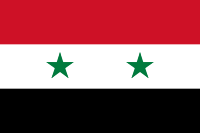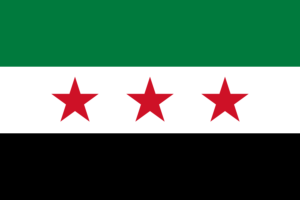15 February 2018
The Curse of Sochi
Still no peace for Syria.
By Neil Tidmarsh
 Winter Olympics 2018: North Korea comes in from the cold, Russia is shut out in the cold. The Russian flag won’t be seen at Pyeongchang, and the Russian national anthem won’t be heard; the Russian team has been banned. Some Russians who’ve proved themselves clean are participating as OARs (Olympic Athletes From Russia), but they’re doing so under the Olympic flag to make it clear that they aren’t representing their country.
Winter Olympics 2018: North Korea comes in from the cold, Russia is shut out in the cold. The Russian flag won’t be seen at Pyeongchang, and the Russian national anthem won’t be heard; the Russian team has been banned. Some Russians who’ve proved themselves clean are participating as OARs (Olympic Athletes From Russia), but they’re doing so under the Olympic flag to make it clear that they aren’t representing their country.
It all kicked off after the last Winter Olympics, at Sochi in Russia in 2014, where longstanding allegations of massive, institutionalised, state-supported cheating came to a head. Investigations by the World Anti-Doping Agency and by the International Olympic Committee followed, and their findings were pretty damning. Many Russian competitors were stripped of medals and titles won at Sochi and Russia was banned from future Olympics.
There was more bad news from Sochi this week – it’s almost as if there’s a curse on the place. The Syrian peace talks backed by Russia, Iran and Turkey which began in the Kazakhstan capital Astana last year moved to Sochi last week – where they more or less collapsed. Kurdish delegates stayed away and opposition factions walked out. Jihadist rebels and the USA and other Western parties were excluded anyway.
 In Syria itself, the ‘de-escalation zones’ and the cease-fires agreed by Russia, Iran, Turkey and the Assad Regime at Astana are now routinely ignored, indeed have never really been observed in the first place. With Isis driven out of its major strongholds and the rebel opposition driven into ever-shrinking enclaves, the conflict is degenerating into an increasingly brutal end-game with the regime and its backers pushing for two objectives: to obliterate the last of the rebels; and to recover all territory lost to Isis, including areas liberated and held by Kurdish forces. The question now is what will the international backers of the regime’s enemies do? Will they step back and leave them to their fate, or will they stand firm and even perhaps step forwards to take a more active role in their support than they have in the past?
In Syria itself, the ‘de-escalation zones’ and the cease-fires agreed by Russia, Iran, Turkey and the Assad Regime at Astana are now routinely ignored, indeed have never really been observed in the first place. With Isis driven out of its major strongholds and the rebel opposition driven into ever-shrinking enclaves, the conflict is degenerating into an increasingly brutal end-game with the regime and its backers pushing for two objectives: to obliterate the last of the rebels; and to recover all territory lost to Isis, including areas liberated and held by Kurdish forces. The question now is what will the international backers of the regime’s enemies do? Will they step back and leave them to their fate, or will they stand firm and even perhaps step forwards to take a more active role in their support than they have in the past?
Answers began to emerge this week. Turkey – supporting rebel groups such as the Free Syrian army, and anxious about Kurdish gains along its border – has had a military presence in northern Syria for the last year. This presence has been more or less tolerated by the Regime, partly because Assad is also anxious about Kurdish gains, and partly because Turkey agreed to enforce the ceasefire (negotiated at Astana) on the rebels in north west Syria and to isolate and alienate the jihadists among them. In recent weeks, however, the regime itself has broken that ceasefire and launched massive attacks and aerial bombardments against rebel-held territory in the north west. This week Turkey responded, indicating that it was not prepared to stand aside while its clients were being pulverised, let alone step back. In the past few days, Turkish troops and tanks have advanced further into Syria to confront Regime forces in Idlib province. If Assad wants to continue his assault on rebel-held territory, he will have to attack the Turkish forces which are now standing in his way.
The USA and other Western countries have been reluctant to involve themselves in the Syrian civil war, focusing on the fight against Isis instead. America and Britain have helped the Kurds in that struggle, and now that the regime is keen to push the Kurds out of the territory they have won from Isis, Assad and his backers must be asking themselves how the American forces embedded with the Kurds will react. This week they found out. Breaking yet another ceasefire, Regime troops (a force of about 500 backed by artillery, tanks and armoured personnel carriers) crossed the Euphrates into Kurdish-held territory in eastern Syria and advanced on a US and western coalition special forces military base, in what seems to have been a deliberately provocative action to see whether the US and western coalition forces would back their Kurdish ally against them or back off. In the event, the US troops stood firm alongside the Kurdish-led SDF and drove off the attack. US artillery and warplanes counter-attacked the regime’s base. Reports claim that more than a hundred regime troops were killed and three regime tanks destroyed. It has also been claimed that Iranian national guards and Russian ‘volunteers’ or ‘mercenaries’ took part in the attack alongside regime troops, but it isn’t known whether any Russians or Iranians were among the casualties.
Assad’s backers, Russia and Iran, have always played a more active and brazen role in the conflict than have his enemies’ backers. Last week, for the first time, a Russian fighter jet was shot down and its pilot killed during an attack on rebel territory in the northwest. Iran is keen to support Assad, a fellow Shia, in order to push back against Sunni power in the region, and to advance its own sphere of influence right up against the borders of Israel, which it has sworn to destroy. Israel is deeply concerned by this build-up of Iranian power in its neighbour Syria. Not only does Iran have a military presence in Syria, it is also helping Hezbollah – the Iranian-backed terror group originally based in Lebanon and dedicated to the destruction of Israel – to embed itself in Syria as a crucial part of Assad’s forces. The Israeli airforce has launched a number of raids into Syria in the last year, in order to stop Iranian weaponry from passing into the hands of Hezbollah, and has reportedly shot down a number of Iranian drones which have penetrated Israeli airspace from Syria. Further conflict between Israel and the Syrian/Iranian partnership erupted this week: the Israeli authorities said that an Iranian spy drone was shot down after entering Israeli airspace at the weekend; the next day, the Israeli airforce launched a bombing raid on the drone base from which it was apparently launched, near Palmyra in Syria; one of the Israeli fighter planes was shot down by Syrian anti-aircraft fire as it returned; further retaliatory raids were launched against Syrian air-defence positions.
While the US, Turkey and Israel are prepared to stand firm, ultimate victory for Assad’s brutal regime is unlikely. Should they decide their allies are expendable and step down, then western interests and status in the Middle East and further afield would be terribly damaged, and the triumph of Russia and Iran would only further destabilise the region. On the other hand, open intervention by the US, Turkey, Israel and other involved countries such as Saudi Arabia runs the very real risk of escalating this internal Syrian conflict into an even more terrible international (even world) war.
The answer, more than ever, must be further peace talks. The Astana initiative, in which Russia, Iran and Turkey tried to keep the business to themselves, was doomed to failure from the start, even before it moved to ill-fated Sochi. All the other parties – the USA, Saudi Arabia, Israel, etc – must be involved as well. It’s time to get the UN initiative in Geneva back on its feet again.

